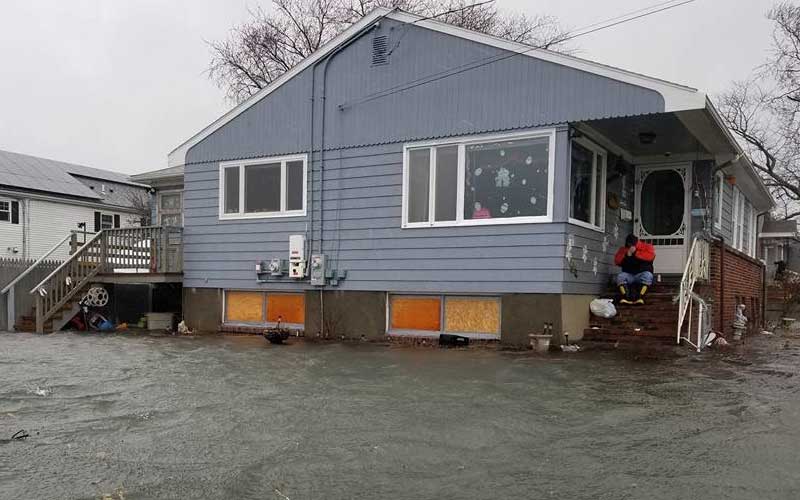
Severe weather and flooding events are increasing in frequency and severity. Photo: CLF
Like most people, I prepare when it looks like a major storm will sweep through my neighborhood and knock out my power. I locate candles, set out flashlights, and make sure my phone and laptop are fully charged. Shockingly, Massachusetts’ electric companies aren’t doing their share of preparation for big storms. Sure, they send out notices to customers and line up their repair trucks and crew. But that’s all for clean-up after the storm has done its worst. And the worst is only getting more intense and frequent due to climate change.
The problem with this is twofold. First, power outages put our health and safety at risk (not to mention the power company crew members forced out into the storm to fix downed lines). Second, it costs utilities millions to clean up after a storm – millions they pass on to all of us in higher electric bills year after year.
This must change. Our utilities could save money and lives by assessing their systems to make sure they can withstand the increasing intensity and frequency of storms fueled by climate change. But right now, they are not compelled to do such planning legally.
A bill currently under consideration in the Massachusetts legislature – An Act Relative to Electric Utility Climate Resilience and Microgrids – requires electric companies to do just that. It also helps unlock a new technology – microgrids – that would make communities more resilient to extreme storms and power outages by creating, storing, and distributing electricity locally when the larger grid goes down.
Electric utilities’ failures have a high cost
Power outages cause many negative impacts, including to our health and safety. Ensuring our electric grid can withstand major storms reduces these disruptions to daily life and our economy. But even when companies can restore service quickly after a storm, they pass on this astronomical cost to all of us through our electric bills. The price tag is already becoming unmanageable and it’s only going to get worse.
For example, Eversource is currently asking the Massachusetts Public Utilities Commission to let it charge customers $440 million in clean-up costs after three storms struck the state in less than 12 months between 2021 and 2022. National Grid has requested recovery of $67 million from one storm, the October 2021 nor’easter.
To put these costs in context, just last year Eversource raised their annual storm recovery fund allocations – the expected average annual storm cost – from $10 million to $30 million. National Grid’s annual contribution is $16 million. These storm funds have long served as a form of self-insurance to help rein in the costs passed on to customers of restoring service after major storms. But both National Grid and Eversource’s funds are currently overdrawn by over $100 million. It makes common and economic sense to invest in planning and preparation rather than repeat the same harmful pattern of storm response again and again.
We must hold utilities accountable
Clearly something needs to change. These storm costs will only continue to go up as storms get more frequent and intense – unless we require the electric companies to invest in safeguarding and upgrading infrastructure. While Eversource and National Grid have said they’ll do some form of this, it’s simply too important to trust them to do it right and within a reasonable time without some oversight. CLF has asked the state to act twice in recent years, but regulators have yet to take action.
The bill currently under consideration would require electric companies to file a vulnerability assessment and resilience plan with state officials every five years. It also makes clear that the regulators can force the companies to pay those costs instead of passing them on to customers if they’re not following their plans. Some communities experience more outages than others, so this bill also requires utilities work with communities most impacted by the effects of climate change, including environmental justice communities, to develop their plans.
In addition to requiring electric companies to take a hard look at their infrastructure and make upgrades where necessary, this bill removes a major legal roadblock to community microgrids. Microgrids are “islandable,” meaning they can continue to operate locally when the rest of the grid goes down, so they can continue providing electricity to critical services like first responders, hospitals, and shelters.
By passing this commonsense bill, we can start upgrading our electric grid before the next big storm catches us underprepared and underfunded.



